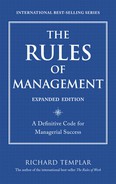Chapter 9. Set Your Boundaries
You have to, right from day one, be totally on top of the discipline issue. Remember earlier we talked about how looking after your team can be a bit like being a parent? Well, as a parent you pretty well have to set boundaries and practice zero tolerance to survive. Give ’em an inch and they’ll take a mile. If you are seen to be soft, they’ll take advantage. The good thing with clear boundaries and zero tolerance is you have a finite line—a yardstick by which you can judge everything. All you have to do is ask, “Is this a breach of the rules?” If it is, stop it. If you do allow it, where do you stop?
Say one of your clear boundaries is timekeeping. (It might be dress or customer care or whatever, but just say it’s timekeeping.) If one minute late is fine, what about two? If two is fine, what about three? And so on until people are wandering in at whatever time they feel like. But if you don’t allow it, then that’s the end of the story. You don’t have to think about that particular issue any more. Whereas if you do allow infringements, small breaches, you are forever having to consider, “Is this a step too far?” “Can I get control back?” “How far am I prepared to go?”
This doesn’t mean you need to have hundreds of rules and be ridiculously inflexible. It means that you need to decide on your few key boundaries that are important to you and to the team and the business. Make them clear. And make them firm.
Remember you are dealing with a team—I will stress this again and again throughout this book—and not an individual. You might feel that for each person an exception can be made, but you aren’t dealing with individuals—you are dealing with a team. If you are seen to be soft on one individual, then you must be soft on all. If you allow one to wander in late, then all must be allowed to wander in late. If one person can get away with breaking the rules, then all must be allowed.
The good manager is firm on inappropriate behavior because this sends out a clear message to all the team—the message that you are a good, firm, in-control sort of manager who sets more store by what the team can achieve collectively than by being thought of as an easy-going, laid-back, nice person. Yes, individually some of the team may rate you as pretty cool if you let them get away with murder, but the team will collectively trash you.
